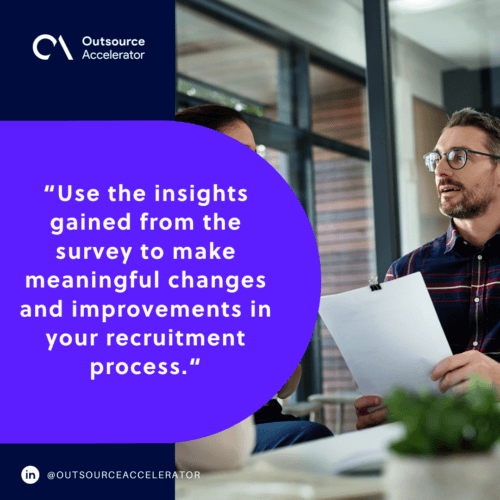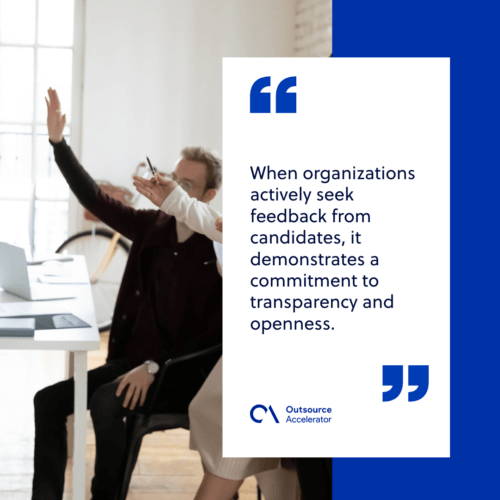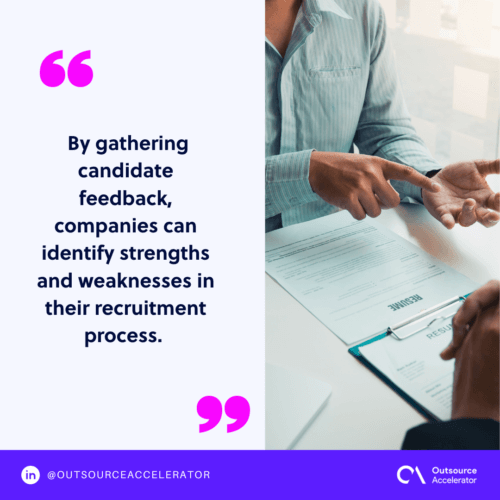21 candidate experience survey questions to ask

Offering a great candidate experience is crucial for attracting and retaining top talent.
How prospective employees perceive your organization during the recruitment process not only influences their decision to join but also impacts your employer brand.
A candidate experience survey is a powerful tool that can help companies assess how well they’re doing in this area. By asking the right questions, you gain valuable insights and identify areas of your recruitment that need improvement.
In this article, we’ll outline relevant candidate experience survey questions that you can utilize to strengthen your organization’s position when it comes to hiring.
What is a candidate experience survey?
A candidate experience survey is a questionnaire that gathers feedback from people who have recently gone through a company’s recruitment process.
These are typically administered to candidates who have completed major stages of the hiring process, regardless of whether they were ultimately hired or not.
Its primary purpose is to assess and understand the quality of the candidate’s experience during their interactions with the company. By gathering candidate feedback, companies can identify strengths and weaknesses in their recruitment process.
Candidate experience surveys also play a crucial role in shaping an employer’s branding efforts. Positive experiences can lead to a stronger reputation in the job market.
How to conduct a candidate experience survey
Conducting a candidate experience survey involves several steps. Here’s how to get started:
Define your objectives
Start by clearly defining the objectives of your survey. Determine what aspects of the candidate experience you want to assess and what insights you hope to gain.
Choose a survey format
Decide on the best method to conduct your survey. You can collect feedback from website surveys, email surveys, or other methods.
Online surveys are convenient and allow for automated data collection, making them a popular choice.
Design the survey
Craft your survey questions carefully to gather meaningful feedback. Include both qualitative and quantitative questions.
Set a timeline
Determine the duration of the survey. It’s typically best to send the candidate experience survey questions shortly after a candidate’s interaction with your company.
This ensures their experience is still fresh in their minds and they can answer comprehensively.
Maintain anonymity
Assure candidates that their responses will remain anonymous and confidential. This can help them feel more comfortable providing honest feedback.
Send the survey
Send the survey to your target audience of recent candidates. Remember to clearly communicate the purpose of the survey, expressing your company’s commitment to improvement.
If this will be your first time doing this, you may want to conduct a pilot test. Send your candidate experience survey questions to a small group to identify any issues with survey design, question clarity, or technical glitches.
Analyze results
Once you’ve collected a sufficient number of responses, analyze the data. A candidate experience survey can help you identify trends, pain points, and areas for improvement in your recruitment process.
Take action
Use the insights gained from the survey to make meaningful changes and improvements in your recruitment process. Address specific issues highlighted by candidates and implement revisions.

Communicate results
Share the findings and the actions you’re taking with internal stakeholders, including recruiters and hiring managers. Transparency can foster a culture of continuous improvement.
21 examples of candidate experience survey questions
Here are sample candidate experience survey questions that you can use as a starting point when designing your own survey:
Pre-application stage
- How did you first hear about our job opening?
- Did our job postings provide clear and accurate information about the role and requirements?
- Was the application process easy to navigate?
Application process
- Were you able to complete the application process without any technical issues?
- Did you receive timely confirmation that your application was received?
- Were you asked for relevant information during the application, or did you find any redundant or unnecessary questions?
Interview process
- How would you rate the clarity and responsiveness of our communication regarding interview scheduling?
- Were you provided with sufficient information about the interview format and expectations?
- Did the interviewers demonstrate professionalism and respect during the interview?
Post-interview stage
- Were you given feedback or an update on your interview status in a timely manner?
- Did you feel that the post-interview communication was clear and informative?
- Were you satisfied with the overall level of communication after your interview?
Overall candidate experience
- On a scale of 1 to 10, how likely are you to recommend our company to a friend or colleague as a place to work?
- What aspects of your candidate experience exceeded your expectations?
- What aspects of your candidate experience do you believe need improvement?
Open-ended questions
- Is there anything else you would like to share about your candidate experience with our organization?
- Do you have any suggestions or recommendations for how we can enhance our recruitment process?
Demographic information (optional)
- Which position did you apply for?
- How did you identify in terms of gender?
- What is your age range?
- How would you describe your overall experience level in your field?
Adapt and customize these questions to align with your specific recruitment process and goals.
Additionally, including a mix of quantitative (rating scale) and qualitative (open-ended) questions will provide a more comprehensive understanding of the candidate’s experience.
Why you need to ask the right candidate experience survey questions
Candidate experience surveys contribute to the feedback process, which is the foundation of effective communication. Conducting this type of survey is important for several reasons:
Gain insights and feedback
By collecting insights from candidate experience surveys, you can gain a deeper understanding of people’s perceptions and preferences. This data-driven approach lets you prioritize changes that have the most significant impact.

Enhance candidate satisfaction
Satisfied candidates are more likely to accept job offers, reducing the risk of candidates declining due to a poor experience. This, in turn, helps you secure top talent for your organization.
Gain candidates’ trust
When organizations actively seek feedback from candidates, it demonstrates a commitment to transparency and openness. This fosters trust, as candidates feel their opinions are valued and that you genuinely care about their experience.
Continuous improvement
A candidate experience survey promotes a culture of continuous improvement. This commitment enables you to adapt to changing candidate expectations and maintain a competitive edge in talent acquisition.
Each response to your candidate experience survey questions is an opportunity for positive change.
Strengthen employer brand
The candidate’s experience plays a crucial role in shaping your employer brand.
Candidates with good experience are more likely to speak positively about your company, even if they weren’t selected. In the future, this may draw in more qualified applicants.
As you embark on the journey to improve your candidate experience, remember that every question is a bridge between your company and the skilled individuals joining you.
It’s essential to realize that the process is not a one-time fix but a continuous evolution. Just as recruitment evolves, so do candidate expectations.








 Independent
Independent




